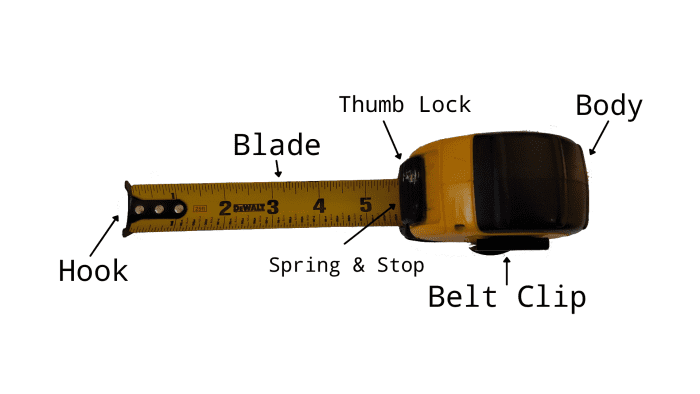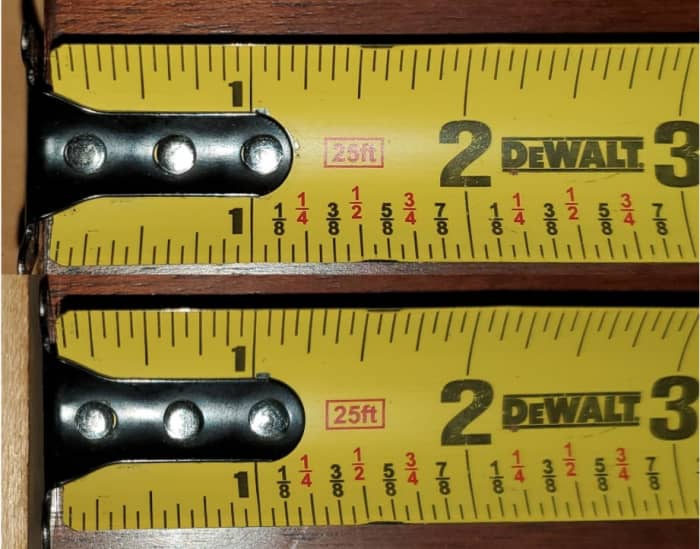Where Is 7 16 of an Inch on a Tape Measure
Chris has a background in construction and has remodeled several houses from roof to foundation and hopes to share some knowledge.

Nearly everyone has a tape measure lying around, in the shop, junk drawer, or who knows where. The tape measure is one of the most common hand tools and most everyone can teach themselves the basics of using it. Although, if you know the tool, then you know there are a lot of small bits of information that can make your measurements much more accurate.
The tape measure is one of the most commonly used tools. So we are going to teach you several things that many do not know but that will help you understand how to use this tool better. Here we will go over several of the basics, such as:
- Why the end is loose
- Different color numbers
- Nail/screw head slot
- Black diamond
- Scribing tool
- Case size extension

The top is hooked over the edge, the bottom is pushing against a board
The Loose Hook
Have you ever noticed that the end of a tape measure is loose and wobbly? This is not an accident or a poorly made tape measure, this is to make the tape measure more accurate. The hook should move 1/16th of an inch, this also should be the thickness of the hook.
Pull the end of the hook, and if it is hooked over the end of a board or edge then it should pull out 1/16th of an inch. If it is pushed into the end of the material the hook acts as a 1/16th filler because the blade is actually 1/16th of an inch short.
This looseness actually makes it so the tape measure can be used as a hook to measure pull against the hook, usually when you measure a distance on a board surface. Or when you push the hook into something, such as when you measure the distance between two walls.
If there was no play in the hook, then you would need to adjust one type of measurement or need two tape measures. One for each type of measurement. This is a simple yet ingenious solution that almost everyone takes for granted.

Colored Numbers on Tape Measure
Most tape measures use black for the standard numbers, these whole numbers will be in the measuring unit your tape measure uses: inches, centimeters, etc. In the DeWalt 33373 tape measure that I use and that is pictures, the fractional measurements alternate colors for ease of reading.
Every 12 inches, there is an arrow with a number in it. This number is yellow because they don't use any coloring and simply let it be the yellow paint that the blade is base coated with. This is simply the incremental foot measurement for this tape measure.
Read More From Dengarden
Every 16th inch is blocked in red, this is standard stud distancing. It is pretty standard for coding reason that utility studs be no more than 16-inch spacing, and since coding is the minimum standard (and cheapest), this is what most people follow. A note that I have seen many posts that state 16 inches center to center, this is the same as 16 inches from left to left, right to right, etc. This is another detail that many do know, and is good for anyone who is remodeling or doing basic construction.

Nail/Screw Head Slot
If you look at the hook on your tape measure, there is generally a slot that is cut into it. It is not a design or a cut-out for lighter weight, it is to allow someone to work by themselves and make measurements from a point that may not have an edge or corner. You can drive a nail or put a screw in and this slot will hold the tape so you can get a good measurement without someone holding the tape in place.
This is also a good way to make a circle by yourself if you need to. Hold the marking tool at the radius size and be steady while you move the tape around the circumference.
The Black Diamond
If you look on a tape measure, there is a black diamond at approximately 19 3/8". The diamond is actually at 19.2 inches, odd to have a decimal marking on a fractional tool, to say the least. These black diamonds are located at 19.2", 38.4", 57.6", 75.8", and 96". 96 inches is the same as eight feet.
This update on tape measures was because of the engineered joist needing a different spacing. This helps with placement to allow the 4-foot x 8-foot subflooring to be laid easier and quicker because of the standardized layout of joists. This is a specific function for a tape measure and mainly used by carpenters. Below is an image of an engineered joist.

A scribe tool is simply a tool that leaves a mark or indentation. By using the edge of the tape measure's hook you can use this to leave a mark on many materials. This comes in very handy when you are trying to work and forgot your pencil someplace on the job site.
This comes in very handy for rough construction such as cutting 2x4's, drywall, etc. Although, using a pencil to make a storyboard is easier to prevent mistakes. The scribing tool is good to keep you from walking back and forth in order to retrieve your pencil and wasting steps.

The Case Extension
If you ever need to measure the inside of a box, room, etc. and you have bent the tape blade and had to guess where the corner would be, then this is the trick for you to know. In some cases, it doesn't matter if you are a 1/4 inch off or not, but if you need to be a little more precise, then use the tape measure body as part of your measurement.
Extend the blade out to the far wall, or whatever area you are measuring, and then push the tape measure body against the other wall or surface. If you take the measurement from the straight edge where the blade enters into the tape and then add the number that is on the bottom of your tape measure. In the case of the DeWalt 33373, this would be 3 1/4 inches (3.25") then you have your total length. This is a neat trick that I am always surprised how few people have heard of it, but it comes in very handy for precision.
This content is accurate and true to the best of the author's knowledge and is not meant to substitute for formal and individualized advice from a qualified professional.
© 2021 Chris Andrews
Where Is 7 16 of an Inch on a Tape Measure
Source: https://dengarden.com/home-improvement/How-to-Use-a-Tape-Measure
0 Response to "Where Is 7 16 of an Inch on a Tape Measure"
Post a Comment